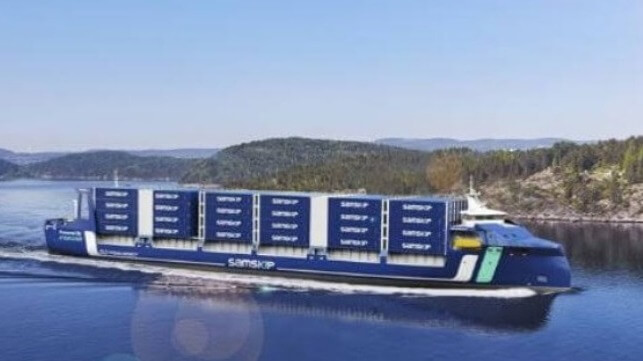Samskip to Build Zero Emission Autonomous Feeder Ships at Cochin

India’s Cochin Shipyard received the contract to build what is being called the world’s first zero-emission feeder container vessels for a project being led by Samskip, a logistics and shipping company based in the Netherlands. First announced last year, the SeaShuttle project envisions hydrogen-powered, remotely controlled, and autonomous-ready containerships that would operate between the Oslo Fjord and Rotterdam.
The contract, which is the second won by the government-controlled Indian shipyard for autonomous vessels, is a prestigious assignment for the shipyard on the world stage. Last year, Cochin delivered two autonomous-ready barges to Norwegian grocery company ASKO. The barges were built to transport freight across the Oslo Fjord and are among the pioneers undergoing certification to develop fully autonomous shipping.
The new contract valued at approximately $66 million, calls for the construction of two ships with a nominal capacity of approximately 500 TEU (365 45-foot containers reports the shipyard). The first vessel is to be delivered in 28 months and the second within 34 months. The Samskip partnership also has options for two additional vessels.
The vessels will be equipped with hydrogen fuel cells in a hybrid power system with a diesel generator backup for longer endurance. Last year, when profiling the plans for the project, Samskip reported that it expected each vessel would be powered by a 3.2 MW hydrogen fuel cell. The vessels will have an onboard storage facility for hydrogen fuel and will be fitted with Azimuth thrusters for propulsion and high maneuverability. It is envisioned that they will transition to green hydrogen fuel when it becomes available and they will also be outfitted to use shore power while in port. According to Cochin, in zero-emission mode, each vessel is expected to achieve a reduction of around 25,000 tons of CO2 per year.

that matters most
Get the latest maritime news delivered to your inbox daily.
Norway’s innovation fund ENOVA, which operates under the Ministry of Climate and Environment, last year awarded approximately $15 million to fund the development and design of the vessels. Marine robotics specialists Ocean Infinity is also a partner in the SeaShuttle project to develop the enabling technologies. Other partners in the project which began in 2019 included Massterly, the technology JV between Kongsberg Maritime and Wilhelmsen, as well as hydrogen integrator HYON.
The Indian government has set a priority to expand the shipbuilding industry. The shipyard marked its fiftieth anniversary last year and is considered the leader in India. Recently, it also won a contract to build two Commissioning Service Vessels (CSOV) that will incorporate large-capacity lithium-ion batteries and be capable of operating on methanol fuel. The vessels were ordered by Pelagic Partners of Cyprus in a deal valued at just over $350 million for ultimately up to six vessels. The first two are both expected to be delivered in Q1 2025.
